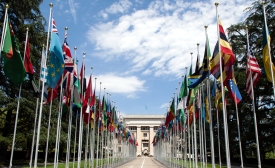soft power
Russian President Vladimir Putin’s covert aggression in Ukraine continues – and so do Western sanctions against his country. But the economy is not all that is under threat; Russia’s soft power is dwindling, with potentially devastating results.
Russian President Vladimir Putin’s covert aggression in Ukraine continues – and so do Western sanctions against his country. But the economy is not all that is under threat; Russia’s soft power is dwindling, with potentially devastating results.
Ask someone in Southeast Asia what comes to mind when you mention "Korea," and the answer is more than likely to be the "Korean Wave." (...) The first ladies of the ASEAN member nations got a look at the place where the wave originated during this week's Korea-ASEAN Summit.
What is power today? Who has it, and who will prevail? Right now, 19th-century hard power is confronting 21st-century soft power. Although hard power appears to have the edge, don’t write off the soft power, and especially economic might.
Kazakhstan is scrambling to keep its diplomatic options open amid rapidly rising Western-Russian tension. Not wanting to get dragged down by Western sanctions imposed on Russia, Kazakhstani President Nursultan Nazarbayev’s administration is ramping up an international charm offensive.

Syracuse University Association of Public Diplomacy Scholars recently published the 2014 Exchange Journal of Public Diplomacy, “Public Diplomacy in Emerging Nations.” This issue aims to observe public diplomacy from a non-American perspective and through comparative studies sheds light on how PD is practiced in Mexico, Russia, India, Turkey, and China.
I used to be asked how the US could deploy its soft power in the Middle East more effectively. That was in the days of the Iraq and Afghan wars and President George W Bush’s ill-advised warnings to the world that “you’re either with us or against us”.
The visit is designed to bolster the “special relationship” between the U.S. and the U.K., a term coined by Winston Churchill after World War II to describe the diplomatic and cultural ties between the two nations.







